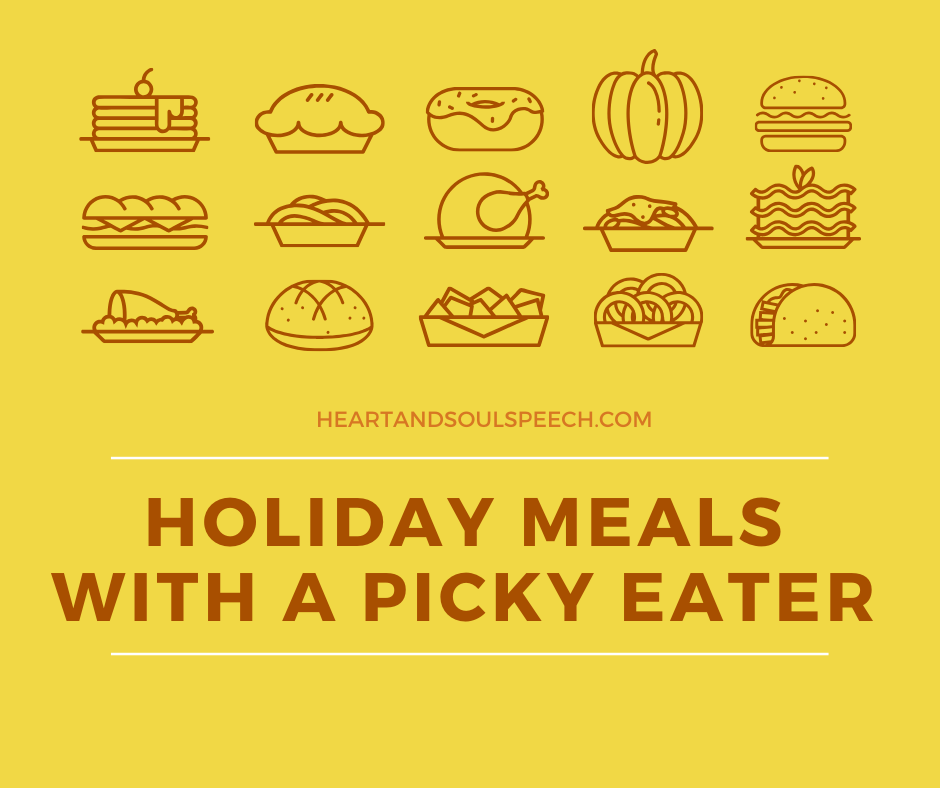
Holidays can be a magical time with fun traditions we look forward to each year. When I think about it, almost all my own holiday traditions are centered around a shared meal and time spent together. One of my favorite things to do is swap recipes with the families I treat to keep my menu interesting–thanksgiving tacos, anyone?! (What’s your favorite?)
But – as a speech pathologist who treats picky eaters and children with feeding disorders – I know holiday meals can be extremely difficult. Holidays mean change. The routine is different. The food is different. The people are different. It can be scary for a child who depends on their preferred foods and mealtime routines. It can be so hard for caregivers of a picky eater to try to accommodate and advocate with the stress of the holidays.

Here’s my tips for helping a picky eater during the holidays:
-
Prepare
Find a time to talk with your child about the holiday meal and what’s on the menu in advance. Try pointing out some of the foods that will be at the holiday meal while grocery shopping or even by looking at pictures of the dishes. Look at photo albums of who will be there. When your child knows what to expect of the meal, there’s no surprises. By having a conversation before the meal, your child has the opportunity to talk through their feelings about new foods and the mealtime routine with you in a more relaxed environment.
-
Signature Dish
Have your child pick and prepare a preferred food to take to the family meal. Help them prepare it in a way that is fun and relaxing. No pressure—it doesn’t matter if it’s pickles with mustard, or pancakes.
*The key here is to make enough for everyone. When there’s enough for everyone, your child isn’t singled out for having their own “special” food. Even if no one else takes a bite of your child’s masterpiece, your child will feel proud of their contribution and included in the meal.
-
Get a Head Start
Offer your child a [filling/high calorie] meal of preferred foods earlier in the day or a preferred snack before or after the meal. This way you don’t have to feel stressed about your child not eating much as the dinner table. Excitement, distraction, anxiety, unusual schedules, expectations, and pressure all suppress appetite-so it’s ok to plan ahead.
-
Bring Out the Fine China
Bring along your child’s favorite plate, cup, and utensils if it would help them feel more comfortable. Let them choose which ones should be their special holiday set!
-
The Secret Weapon
Have a dipper ready. Get your child’s favorite condiments out for the main meal. –It’s also highly likely someone else is thankful the ketchup is on the table too! Who knows, maybe your little one will try some turkey if it’s swimming in Ranch?!
-
Hit the Buffet Line
If your child is not accustomed to serving themselves at a family style meal (either buffet or spoon and pass), it may be overwhelming at first. However, this way of serving allows the child to inspect each food and decide –what and how much– goes on their plate. Even if they only choose a plate full of mashed potatoes, they have seen and smelled all the options. (Think about getting a whiff of that sage and rosemary stuffing getting passed around!) What a great way to increase exposure and experience with new foods!
Also, each food usually has its own serving utensil and therefore is a great way to have children serve themselves without worrying about foods touching or mixing.
-
Follow Your Child’s Lead
Respect your child’s ability to choose what goes on their plate (at this meal) and remind them it is their choice if they eat a particular food or not (like always).
-
Holidays may not be the best time to pressure new foods.
Sometimes in feeding therapy, we use different strategies to challenge and support picky eaters trying new foods. Holiday meals are probably not the best time to focus on therapy (unless encouraged by your therapist 🙂 Stick to the tried and true foods to decrease stress for both of you.
-
Try to stay close to your typical eating and sleeping times.
Children’s bodies are highly regulated to their appetite and sleep patterns. The holiday schedule often is a little bit more relaxed, but things can spiral out of control quickly. Keep an eye on your little one’s cues to avoid a mealtime meltdown.
-
Enjoy Your Meal!
Focus on how delicious everything is that you chose to put on your plate. It’s likely your child is also enjoying everything they chose to put on their plate. You are sharing a meal with family and friends. You know your child is doing the best they can. You support your child and you know what’s best for them.
Now, go get some seconds!
